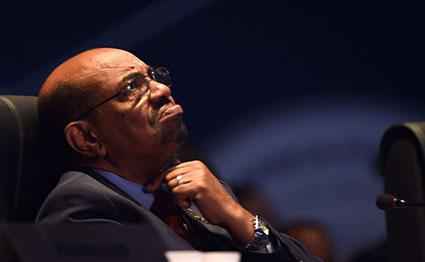He may have been swept off the political scene by an army coup two years ago but former President Omar al-Bashir remains a key factor in Sudan’s fragile transition to democracy.
When the current regime in Khartoum put down a recent bid by the “forces of darkness” to overthrow it, there was an air of inevitability about who would eventually be blamed for the abortive insurrection.
The regime in Khartoum is still picking up the pieces from the fallout following last week’s failed coup.
Information Minister Hamza Balloul was explicit in his words about who the regime thought were responsible.
Remnants of the old guard still “romanticising” a comeback for allies of deposed military strongman Omar al-Bashir were heavily involved in the bid to “hijack” the transition process.
Many Sudanese concurred given the climate of mistrust attending to the transition period.
Fingers of accusation were not pointed past the Armoured Corps in the Shagara suburb located in the south of the capital Khartoum as the main drivers of the abortive putsch.
This area of the city has been identified as home to many Sudanese – civilian and military alike – with strong connections to Bashir proteges nostalgic about the past.
As economic hardship bites harder across Sudan, fueling social discontent with the post-Bashir regime, these elements saw their chance, says APA’s former correspondent in Khartoum, Ezaldeen Arbaab.
“Like it or not Bashir is still a factor albeit divisive in Sudanese politics” he adds.
“Bashir remnants are still active in key institutions like the army and civil service where old loyalties die hard” he observes.
With the current military-civilian regime investigating corruption and confiscating bank accounts and properties worth hundreds of millions of dollars, old feathers have been ruffled and one of the consequences have been desperate bids to discredit this attempt at “national restitution”.
77-year-old Bashir himself was the main subject of interest by Sudanese graft investigators after an unspecified stash of US dollars was discovered apparently hidden in his Khartoum home.
This prompted formal corruption-related charges being brought against him and he was eventually convicted in December 2019 and sentenced to two years in prison.
His prosecution had opened up a can of worms incriminating some of his most trusted aides and proteges who are desperate to avoid going down without putting up a fight.
They include some at the top of the Sudanese business charts and their military allies who benefitted in one way or the other from the spoils of the Bashir era which lasted thirty years (1989 to 2019).
Several private companies have strong links with a so-called military cabal which in turn has connections with Bashir, says Arbaab who points out that this “privileged group” would stop at nothing to undermine the national rectification exercise being undertaken by Prime Minister Abdalla Hamdok.
Resentments still run deep within the Sudanese security system as evidenced by multiple coup attempts since Bashir’s ouster more than two years ago.
In his statement about the foiled coup PM Hamdok even obliquely acknowledged that his government was in the middle of a fight to dismantle old regime structures as part of “fortifying the transition”.
The torrid economic times in the country have not made managing this simmering resentment easier.
With record declines in the value of the Sudanese pound, the African Development Bank says real GDP shrunk by 8.4 percent in 2020 after a 2.5 percent drop in 2019 thanks to COVID–19 pandemic lockdown measures which left their toll on economic activities.
Inflation went up 124.9 percent in 2020, “mainly due to a 118 percent currency depreciation and monetization of the fiscal deficit”.
Sudan’s import and export levels have also lowered.
This has not helped the integrity of the transition process for ordinary Sudanese who are still patient despite their lack of faith in the regime to deliver on its multiple promises, one of them economic stability.
However, as one analyst puts it, like a stubborn stain refusing to be scrubbed off, Bashir and his entourage will continue to be the make or break factor for Sudan’s delicate transition to democracy.
WN/as/APA


